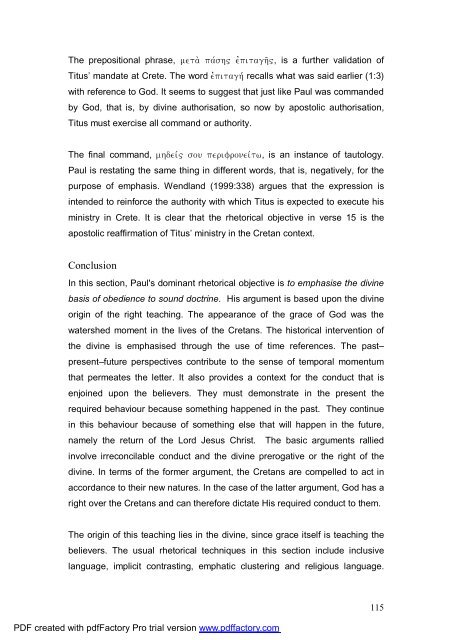A Text centred rhetorical analysis of Paul's Letter to Titus
A Text centred rhetorical analysis of Paul's Letter to Titus
A Text centred rhetorical analysis of Paul's Letter to Titus
You also want an ePaper? Increase the reach of your titles
YUMPU automatically turns print PDFs into web optimized ePapers that Google loves.
The prepositional phrase, meta; pavsh" ejpitagh`", is a further validation <strong>of</strong><br />
<strong>Titus</strong>’ mandate at Crete. The word ejpitaghv recalls what was said earlier (1:3)<br />
with reference <strong>to</strong> God. It seems <strong>to</strong> suggest that just like Paul was commanded<br />
by God, that is, by divine authorisation, so now by apos<strong>to</strong>lic authorisation,<br />
<strong>Titus</strong> must exercise all command or authority.<br />
The final command, mhdeiv" sou perifroneivtw, is an instance <strong>of</strong> tau<strong>to</strong>logy.<br />
Paul is restating the same thing in different words, that is, negatively, for the<br />
purpose <strong>of</strong> emphasis. Wendland (1999:338) argues that the expression is<br />
intended <strong>to</strong> reinforce the authority with which <strong>Titus</strong> is expected <strong>to</strong> execute his<br />
ministry in Crete. It is clear that the <strong>rhe<strong>to</strong>rical</strong> objective in verse 15 is the<br />
apos<strong>to</strong>lic reaffirmation <strong>of</strong> <strong>Titus</strong>’ ministry in the Cretan context.<br />
Conclusion<br />
In this section, <strong>Paul's</strong> dominant <strong>rhe<strong>to</strong>rical</strong> objective is <strong>to</strong> emphasise the divine<br />
basis <strong>of</strong> obedience <strong>to</strong> sound doctrine. His argument is based upon the divine<br />
origin <strong>of</strong> the right teaching. The appearance <strong>of</strong> the grace <strong>of</strong> God was the<br />
watershed moment in the lives <strong>of</strong> the Cretans. The his<strong>to</strong>rical intervention <strong>of</strong><br />
the divine is emphasised through the use <strong>of</strong> time references. The past–<br />
present–future perspectives contribute <strong>to</strong> the sense <strong>of</strong> temporal momentum<br />
that permeates the letter. It also provides a context for the conduct that is<br />
enjoined upon the believers. They must demonstrate in the present the<br />
required behaviour because something happened in the past. They continue<br />
in this behaviour because <strong>of</strong> something else that will happen in the future,<br />
namely the return <strong>of</strong> the Lord Jesus Christ. The basic arguments rallied<br />
involve irreconcilable conduct and the divine prerogative or the right <strong>of</strong> the<br />
divine. In terms <strong>of</strong> the former argument, the Cretans are compelled <strong>to</strong> act in<br />
accordance <strong>to</strong> their new natures. In the case <strong>of</strong> the latter argument, God has a<br />
right over the Cretans and can therefore dictate His required conduct <strong>to</strong> them.<br />
The origin <strong>of</strong> this teaching lies in the divine, since grace itself is teaching the<br />
believers. The usual <strong>rhe<strong>to</strong>rical</strong> techniques in this section include inclusive<br />
language, implicit contrasting, emphatic clustering and religious language.<br />
PDF created with pdfFac<strong>to</strong>ry Pro trial version www.pdffac<strong>to</strong>ry.com<br />
115

















